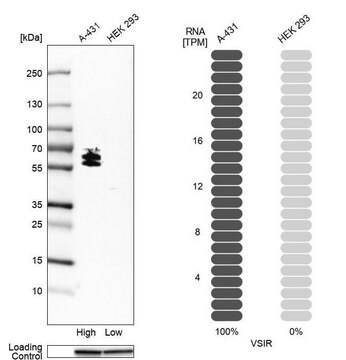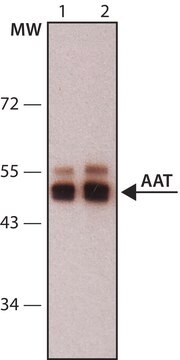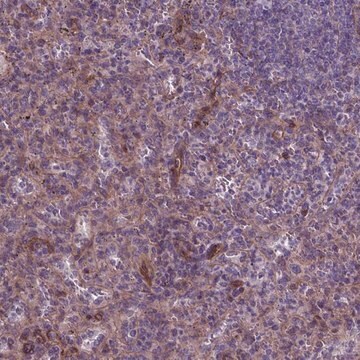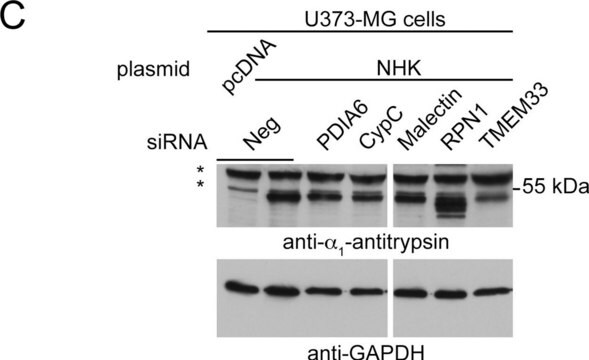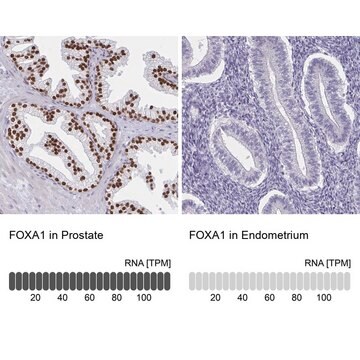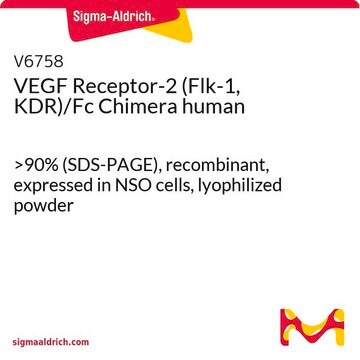おすすめの製品
由来生物
mouse
品質水準
結合体
unconjugated
抗体製品の状態
purified antibody
抗体製品タイプ
primary antibodies
クローン
9D9F9, monoclonal
分子量
calculated mol wt 152.76 kDa
observed mol wt ~190 kDa
精製方法
using protein G
化学種の反応性
human
包装
antibody small pack of 100 μL
テクニック
immunocytochemistry: suitable
immunohistochemistry (formalin-fixed, paraffin-embedded sections): suitable
immunoprecipitation (IP): suitable
western blot: suitable
アイソタイプ
IgG1
エピトープ配列
Extracellular domain
タンパク質IDアクセッション番号
UniProtアクセッション番号
輸送温度
2-8°C
ターゲットの翻訳後修飾
unmodified
遺伝子情報
human ... FLT4(2324)
詳細
Vascular endothelial growth factor receptor 3 (UniProt: P35916; also known as EC:2.7.10.1, VEGFR-3, Fms-like tyrosine kinase 4, FLT-4, Tyrosine-protein kinase receptor FLT4) is encoded by the FLT4 (also known as VEGFR3) gene (Gene ID: 2324) in human. FLT-4 is a single-pass type I membrane glycoprotein that is synthesized with a signal peptide (aa 1-24), which is subsequently cleaved off to generate the mature form that contains an extracellular domain (aa 25-775), a transmembrane domain (aa 776-796), and cytoplasmic domain (aa 797-1363). It is expressed in endothelial cells and is also detected in fetal spleen, lung, and brain. In adults it is detected in liver, muscle, thymus, placenta, lung, testis, ovary, prostate, heart, and kidney. FLT-4 has tyrosine-protein kinase activity and acts as a receptor for VEGFC and VEGFD. It plays a role in adult lymphangiogenesis and in the development of the vascular network and the cardiovascular system during embryonic development. Its secreted form functions as a decoy receptor for VEGFC and/or VEGFD and play an important role as a negative regulator of VEGFC-mediated lymphangiogenesis and angiogenesis. Its major function is to promote proliferation, survival, and migration of endothelial cells, and regulates angiogenic sprouting. FLT-4 undergoes trans auto-phosphorylation on tyrosine residues upon ligand binding. Phosphorylation at tyrosine 1068 is required for autophosphorylation at additional tyrosine residues. Phosphorylation at tyrosine 1063 and 1337 are important for interaction with Crk adaptor proteins and subsequent activation of MAPK8. In addition, its phosphorylation at tyrosine 1230, 1231, and 1337 are reported to be important for interaction with Grb2 and subsequent activation of the AKT1 and ERK1/ERK2 signaling pathways.
特異性
Clone 9D9F9 is a mouse monoclonal antibody that detects Vascular endothelial growth factor receptor 3 (VEGFR-3). It targets an epitope within the extracellular domain.
免疫原
A recombinant fragment corresponding to the extracellular domain of human Vascular endothelial growth factor receptor 3 (VEGFR-3).
アプリケーション
Quality Control Testing
Evaluated by Western Blotting in lysate from HEK293 cells over-expressing VEGFR-3.
Western Blotting Analysis (WB): A 1:500 dilution of this antibody detected Vascular endothelial growth factor receptor 3 (VEGFR-3) in lysate from HEK293 cells over-expressing human VEGFR-3.
Tested Applications
Immunoprecipitation Analysis: A representative lot immunoprecipitated VEGF Receptor-3 in Immunoprecipitation applications (Bando, H., et al. (2004). Int J Cancer; 111(2):184-91).
ELISA Analysis: A representative lot detected VEGF Receptor-3 in ELISA applications (Bando, H., et al. (2004). Int J Cancer; 111(2):184-91).
Immunohistochemistry (Paraffin) Analysis: A 1:250 dilution from a representative lot detected VEGF Receptor-3 in human placenta and human kidney tissue sections.
Western Blotting Analysis: A representative lot detected VEGF Receptor-3 in Western Blotting applications (Bando, H., et al. (2004). Int J Cancer; 111(2):184-91; Zhang, Y., et al. (2018). Nat Commun.; 9(1):1296).
Immunohistochemistry Applications: A representative lot detected VEGF Receptor-3 in Immunohistochemistry applications (Bando, H., et al. (2004). Int J Cancer; 111(2):184-91; Jussila, L. et al. (1998). Cancer Res.; 58(8):1599-604; Su, C., et al. (2011). J Exp Clin Cancer Res.; 30(1):85; Valtola, R., et al. (1999). Am J. Pathol.; 154(5):1381-90).
Immunocytochemistry Analysis: A 1:100 dilution from a representative lot detected VEGF Receptor-3 in human umbilical vascular endothelial cells (HUVEC).
Note: Actual optimal working dilutions must be determined by end user as specimens, and experimental conditions may vary with the end user
Evaluated by Western Blotting in lysate from HEK293 cells over-expressing VEGFR-3.
Western Blotting Analysis (WB): A 1:500 dilution of this antibody detected Vascular endothelial growth factor receptor 3 (VEGFR-3) in lysate from HEK293 cells over-expressing human VEGFR-3.
Tested Applications
Immunoprecipitation Analysis: A representative lot immunoprecipitated VEGF Receptor-3 in Immunoprecipitation applications (Bando, H., et al. (2004). Int J Cancer; 111(2):184-91).
ELISA Analysis: A representative lot detected VEGF Receptor-3 in ELISA applications (Bando, H., et al. (2004). Int J Cancer; 111(2):184-91).
Immunohistochemistry (Paraffin) Analysis: A 1:250 dilution from a representative lot detected VEGF Receptor-3 in human placenta and human kidney tissue sections.
Western Blotting Analysis: A representative lot detected VEGF Receptor-3 in Western Blotting applications (Bando, H., et al. (2004). Int J Cancer; 111(2):184-91; Zhang, Y., et al. (2018). Nat Commun.; 9(1):1296).
Immunohistochemistry Applications: A representative lot detected VEGF Receptor-3 in Immunohistochemistry applications (Bando, H., et al. (2004). Int J Cancer; 111(2):184-91; Jussila, L. et al. (1998). Cancer Res.; 58(8):1599-604; Su, C., et al. (2011). J Exp Clin Cancer Res.; 30(1):85; Valtola, R., et al. (1999). Am J. Pathol.; 154(5):1381-90).
Immunocytochemistry Analysis: A 1:100 dilution from a representative lot detected VEGF Receptor-3 in human umbilical vascular endothelial cells (HUVEC).
Note: Actual optimal working dilutions must be determined by end user as specimens, and experimental conditions may vary with the end user
Anti-VEGF Receptor-3, clone 9D9F9, Cat. No. MAB3757-I, is a mouse monoclonal antibody that detects VEGF receptor 3 and is tested for use in ELISA, Immunocytochemistry, Immunohistochemistry (Paraffin), Immunoprecipitation, and Western Blotting.
物理的形状
Purified mouse monoclonal antibody IgG1 in buffer containing 0.1 M Tris-Glycine (pH 7.4), 150 mM NaCl with 0.05% sodium azide.
保管および安定性
Recommend storage at +2°C to +8°C. For long term storage antibodies can be kept at -20°C. Avoid repeated freeze-thaws.
その他情報
Concentration: Please refer to the Certificate of Analysis for the lot-specific concentration.
免責事項
Unless otherwise stated in our catalog or other company documentation accompanying the product(s), our products are intended for research use only and are not to be used for any other purpose, which includes but is not limited to, unauthorized commercial uses, in vitro diagnostic uses, ex vivo or in vivo therapeutic uses or any type of consumption or application to humans or animals.
適切な製品が見つかりませんか。
製品選択ツール.をお試しください
保管分類コード
12 - Non Combustible Liquids
WGK
WGK 1
試験成績書(COA)
製品のロット番号・バッチ番号を入力して、試験成績書(COA) を検索できます。ロット番号・バッチ番号は、製品ラベルに「Lot」または「Batch」に続いて記載されています。
ライフサイエンス、有機合成、材料科学、クロマトグラフィー、分析など、あらゆる分野の研究に経験のあるメンバーがおります。.
製品に関するお問い合わせはこちら(テクニカルサービス)